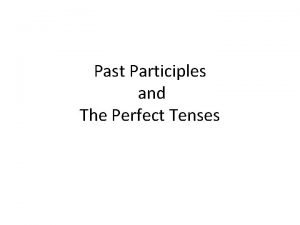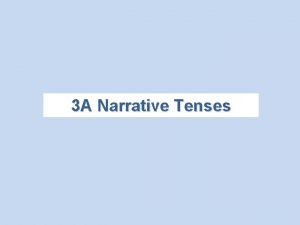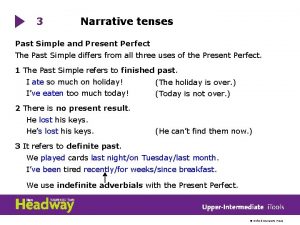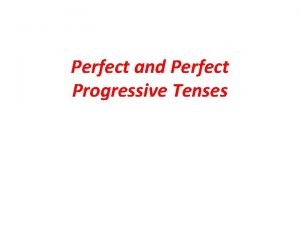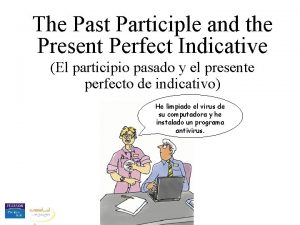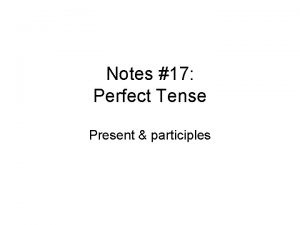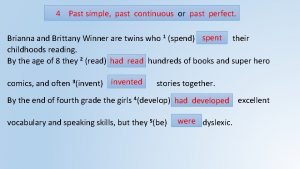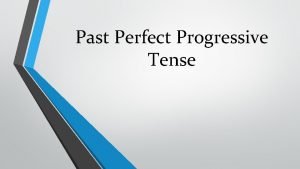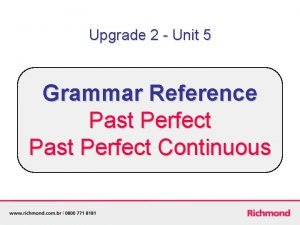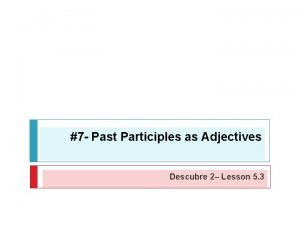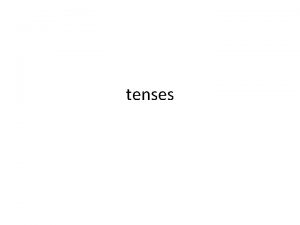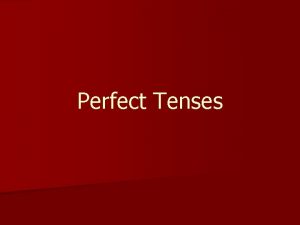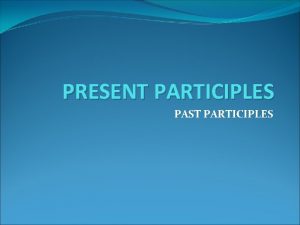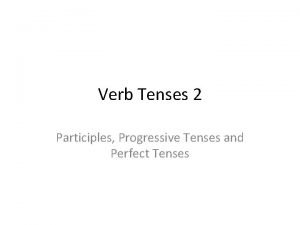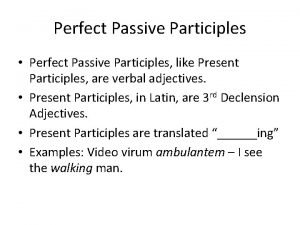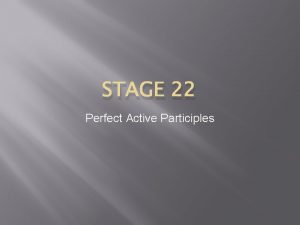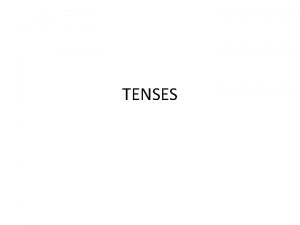Past Participles and The Perfect Tenses Past Participles



















- Slides: 19

Past Participles and The Perfect Tenses

Past Participles Past participles are equivalent to the –ed verb ending in English. When used as a verb, they cannot stand alone and must be accompanied by an auxiliary verb. More about that later. They are also used as adjectives and are used in the passive voice.

Past Participles: Formation For –AR verbs, add –ado to the stem Hablado Cantado Nadado

Past Participles: Formation For –ER and –IR verbs, add –ido to the stem comido debido tenido vivido decidido mentido

Past Participles: Formation For –ER and –IR verbs whose stems end in a vowel, add an accent mark to the “i” leído traído creído caído oído

Past Participles: Irregulars There are several irregular Past Participles: abierto descubierto dicho roto vuelto escrito descrito puesto suelto revuelto cubierto hecho muerto resuelto devuelto

Past Participles as Adjectives Past Participles can be used as adjectives. Like all adjectives, they must agree in number and gender with the nouns they modify. La puerta está cerrada. Las chicas están preocupadas. El coche está roto. Los libros están abiertos.

Active Voice vs. Passive Voice Active voice: the subject does the action followed by an object El autor escribió la novela. Passive voice: the object of the active sentence becomes the subject La novela fue escrita por el autor. Notice the past participle agrees in number and gender with the subject in the passive voice.

The Present Perfect Tense • a past tense that expresses that an action has occurred in the recent past • it is a compound tense formed by the present tense of the auxiliary verb HABER + past participle • the word “ya” is often used to express the event has happened already

The Present Perfect Tense The Present Tense of HABER he has ha hemos habéis han

Present Perfect Tense He comprado el regalo. I have purchased the gift. Ha preparado la tarea. He has prepared the homework. Has comido el desayuno ya. I have already eaten breakfast. Hemos abuerto las ventanas. We have opened the windows. Han descrito los planes. They have described the plans.

Present Perfect • NOTE: Do not use the Present Perfect to express that someone has just finished an action. Use the following construction instead: acabar de + infinitive Acabo de terminar el examen. I just finished the test.

Past Perfect Tense • The past perfect tense is used to express that a past action had happened before another • It is often used with the expressions antes de, ya, nunca, todavía • To form the Past Perfect, use the Imperfect tense of the auxiliary verb HABER + past participle • The past participle ending does not change its ending for agreement purposes; it ends in “o”

Past Perfect HABER (imperfect) habías habíamos habíais habían

Past Perfect Yo había jugado antes de llamarte. I had played before I called you. Habíamos terminado el proyecto ya cuando Marcos llegó. We had already finished the project when Marcos arrived.

Future Perfect • Expresses what will have happened HABER (future) + past participle habré habrán habrá habremos habréis habrán

Future Perfect Habré seleccionado la mejor opción. I will have selected the best option. Uds. habrán votado por el candidato apropiado. You-all will have voted for the appropriate candidate.

Conditional Perfect • Expresses what would have or could have happened HABER (conditional) + past participle habrías habríamos habríais habrían

Conditional Perfect Ella habría llegado a ser médica. She would have become a doctor. Nos habríamos graduado con honores. We could have graduated with honors.
 Participles and perfect tenses
Participles and perfect tenses He has ha hemos
He has ha hemos Narrative tenses past continuous
Narrative tenses past continuous Narrative tenses presentation
Narrative tenses presentation Present perfect tense of change
Present perfect tense of change Chapter 3 perfect and perfect progressive tenses
Chapter 3 perfect and perfect progressive tenses Past porfect
Past porfect Past perfect simple past perfect progressive
Past perfect simple past perfect progressive Present perfect tense - past participles
Present perfect tense - past participles Present participle perfect
Present participle perfect Whats a helping verb
Whats a helping verb Past perfect present perfect future perfect
Past perfect present perfect future perfect Englisch grundlagen
Englisch grundlagen Past simple past perfect past continuous
Past simple past perfect past continuous Simple past tense function
Simple past tense function Past perfect after
Past perfect after Past perfect vs past perfect continuous
Past perfect vs past perfect continuous Past simple past continuous past perfect timeline
Past simple past continuous past perfect timeline Perfect passive participle latin
Perfect passive participle latin Past participle as adjective spanish
Past participle as adjective spanish

